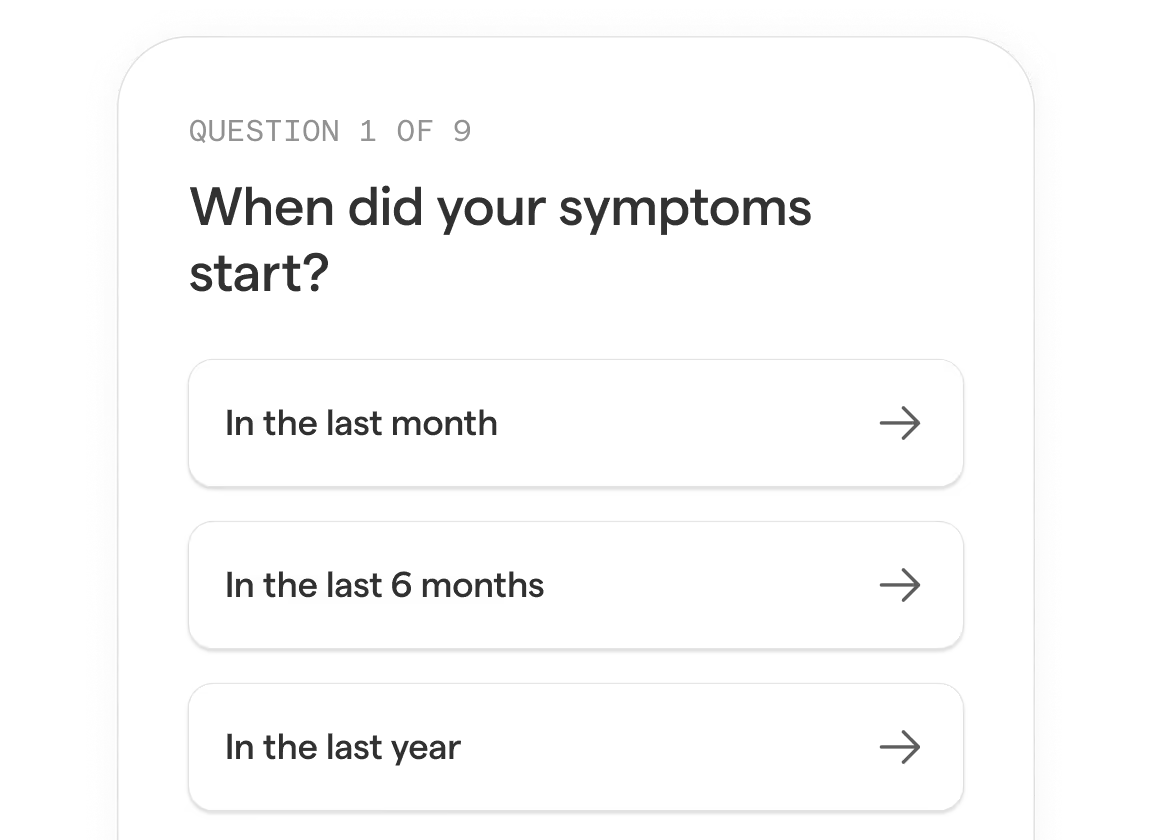Download the Felix App
Earn reward, visit our shop and get exclusive offers on the app
Download now

Through Felix, you can get Cialis prescribed by a licensed healthcare practitioner with free delivery to your door.
Cialis (tadalafil) belongs to the cGMP-Specific Phosphodiesterase Type 5 Inhibitor (PDE5) family of medications.
Cialis is primarily used as a treatment for erectile dysfunction (ED), but in some cases, it’s also used for treating the signs and symptoms of benign prostatic hyperplasia (BPH).
For more resources, including a full list of the risks and benefits of Cialis, please review the product monograph.
Treatment of ED: Following sexual stimulation, Cialis works by helping the blood vessels in your penis to relax, allowing the flow of blood into your penis. This results in improved erectile function.
It’s important to note that sexual stimulation is still needed for Cialis to function.
Cialis is most commonly used as a treatment for the symptoms of erectile dysfunction (ED).
In some cases, Cialis is used to treat the signs and symptoms of benign prostatic hyperplasia (BPH).
In most cases, Cialis prescriptions are taken as needed, between 30-60 minutes before starting sexual activity. Its median full-effect takes place around 2 hours after taking Cialis, but its effects can last up to 36 hours from a single dose.
However, when once-a-day Cialis prescriptions are recommended, timing for the pill doesn’t matter as much. It’s only recommended that the dose is taken at roughly the same time each day, so that its effects are maximized. It may take up to 5 days for once-a-day Cialis to reach steady blood levels.
The most common side effects from using Cialis include:
Uncommon side-effects:
Allergic reactions (including skin rashes). In rare cases, people may experience a priapism; in which an erection lasts for more than four hours.
Sudden decrease or loss of vision has occurred rarely after the use of oral erectile dysfunction medications, including Cialis. If this occurs, it’s best to seek immediate medical attention.
If you start to experience any serious side effects, it’s best to talk to your healthcare practitioner at Felix about them. They’ll be able to suggest a different dosage or alternative medications, which may be a better option for you.
There are a number of people that should avoid using Cialis, such as:
In addition to these concerns, people with a history of cardiovascular issues, or a renal impairment should be sure to discuss these issues with their healthcare practitioner, before starting Cialis.
Women are not intended to use Cialis, and there are minimal studies to explore the potential outcomes, so it’s best for people assigned female at birth to not take this medication.
Further reading


























According to the manufacturer, drinking excessive alcohol (they define it as 5 glasses of wine or 5 shots of whiskey) can increase your chances of getting a headache or getting dizzy, your heart rate increasing, or lowering your blood pressure.
If you’re planning on having a single beer or glass of wine you may not experience a difference in effectiveness. However, it is still sensible to minimize alcohol consumption when taking Cialis and alcohol.
Yes, Cialis does expire. Always check the expiration date on your prescription before taking it.
Cialis does not make you bigger. By relaxing the blood vessels around the penis, Cialis and other PDE5 inhibitors may help you get and maintain an erection, but this process will do nothing for your penile size.
Having more blood flowing in there might make it feel bigger. More blood flowing to the penis can give you a firmer erection that may alter the sexual experience for you and your partner.
In Canada, you must first speak with a licensed healthcare practitioner, before you can get an online Cialis prescription.
Felix makes this process quick and convenient for our patients. Just complete an online assessment with one of our healthcare practitioners, and they’ll be able to tell you whether they think Cialis is right for you.
Best of all, if you are given a prescription, Felix will ship your medication right to your home for free!
No, you absolutely do not need to waste weeks trying to schedule an appointment, or sit around a packed waiting room, where they’ll ask you to declare your issue in front of everyone there.
With Felix, you can speak with a licensed healthcare practitioner from the privacy of your home by completing a short online assessment.
Then if they believe it’s an appropriate treatment option for you, based on your current condition and medical history, they’ll be able to write you an online Cialis prescription.
The regulations in Canada are that you must first talk to a licensed healthcare practitioner, before you’re able to request any type of Cialis prescription.
Thankfully, you can do this through Felix, at your convenience. Just complete an online assessment, and if your healthcare practitioner believes Cialis is right for you (based on your condition and medical history), they’ll be able to write you a prescription.
You can’t buy Cialis pills online without a prescription, in Canada. This means that you’ll need to speak with a licensed healthcare practitioner to get a prescription.
Felix has a wonderful team of experts that are licensed to help patients with these types of conditions. Best of all, if they think Cialis is right for you, they can ship your prescription to your home for free.
No, Cialis is not available over-the-counter in Canada.
However, you can get online Cialis prescriptions through Felix’s seamless process. Just complete an online assessment, and if your healthcare practitioner thinks that it’s the right choice for you, they can write you a prescription for Cialis online.
Plus, with Felix, you can have your medication shipped discreetly to your home, at no extra charge.
The cost of Cialis in Canada depends on the dose and brand of the tablets being purchased. Cialis is a brand name, and brand-name medications are generally more expensive than their generic counterparts. You can choose if you want to purchase the brand name or the generic version. Your healthcare practitioner will determine the appropriate dose.
You’ll be able to see the estimated cost of Cialis during your online visit. The prices you see will also include the Felix Pharmacy fill fee based on your refill schedule. Should you choose to have your medication dispensed through the Felix Pharmacy network, there will be no additional shipping costs on top of the cost of Cialis and the filling fee. If you have insurance or benefits that cover some or all of the price of the medication, this will be deducted from the price that you pay.
However, keep in mind that this won’t show up in your account until our pharmacy partners fill your prescription. If you ever want to pause your Cialis refills, it’s easy to do so with Felix. In this case, any payments will be paused until you’re ready to resume your prescription.
During your online visit you'll be asked. for information about your health history for the healthcare practiitoner to review. Your Felix practitioner will use this information to determine safety and potential side effects.
Felix is Canada’s first truly integrated healthcare platform. We provide on-demand treatment for everyday health needs like weight loss, mental health, sexual health, and more. Founded in 2019, our digital-first approach to healthcare includes everything from diagnosis to prescription — all accessible from the comfort of home.
No. Felix provides a faster, hassle-free way for you to get a treatment plan for certain conditions, but our service does not replace your primary care provider. For matters that extend beyond obtaining a lifestyle treatment safely and easily, we encourage you to consult your primary health practitioner in person — whether for checkups, personal health concerns, or to inform them about your current treatments or treatment plans.
Absolutely. Our online assessments have been designed to ask all the necessary questions required for diagnosis. We've worked with specialists to create an assessment process that can provide sufficient information for the healthcare practitioner to determine whether or not you are eligible for a prescription and craft an appropriate treatment plan.
Call 911 or proceed to your nearest emergency room immediately. Felix is not intended for medical emergencies. Once the emergency has been addressed or resolved, contact your prescribing practitioner to inform them of your experience as this may impact your current treatment plan.
Anyone who is 18 years or older (16 or older for acne and birth control prescriptions), and is located in Alberta, British Columbia, Manitoba, Newfoundland and Labrador, Nova Scotia, Prince Edward Island, Saskatchewan or Ontario. We cannot ship treatments outside of these provinces at this time.
After creating an account, you will complete a medical assessment for evaluation by one of the Felix healthcare practitioners.
During your assessment, you will have the opportunity to send your practitioner questions via secure messaging.
In most cases, practitioners will complete your assessment with secure messaging alone but sometimes they may determine you require an audio or video visit and/or further diagnostic testing to help determine the best treatment plan for you.
If your practitioner has determined a prescription treatment is appropriate, they will approve your visit and write you a prescription. Our pharmacy will then ship your prescription to your home.
You’ll be able to message your healthcare practitioner if you have questions or want to make changes to your treatment at any time.
No. We use an asynchronous telemedicine model so you can complete your online visit in your own time and we save your progress so you can come back later to finish it.
If you are completing a visit in the mental health or weight loss categories, your healthcare practitioner may require a phone or video call to discuss your medical profile further during the assessment process.
Most assessments do not require a phone or video conversation. Once a prescriber has reviewed the info in your assessment they will respond to you via secure instant messages that you can access within your Felix account.
If you are completing a visit in the mental health or weight loss categories, your healthcare practitioner may require a phone or video call to discuss your medical profile further during the assessment process.
You can expect to receive a response from a healthcare practitioner within 24 hours of submission. If you’ve been waiting longer than this, please reach out to our Patient Support team through the chat bubble in the bottom right corner of your account or our Contact Us page.
No. A visit with a licensed healthcare practitioner is required for all treatments currently provided through Felix’s service.
Not long. After completing your assessment, a practitioner will generally respond within 24 hours, and often much sooner.
Treatment plans will be processed within 2-4 business days of your approval date if there is nothing blocking fulfillment.
All packages usually takes 2-3 business days. You will receive an email with your tracking number once your treatment has been shipped.
Absolutely. All Felix shipments arrive in a nondescript blister package so you can have your treatment shipped wherever makes sense for you as long as there is someone there to sign for it.
A signature upon delivery may be required.
There is currently no cost to have your treatment shipped to you from our Felix Pharmacy network.
Yes, your security is paramount to Felix’s mission. Personal health information provided during your medical assessment is strictly and legally confidential between you and the Felix healthcare practitioner.
Beyond that, all your account information (including the medical assessment, credit card, and shipping information, etc.) is also stored safely and securely. Felix is compliant with all federal and provincial health privacy legislation. It is our duty to protect your data with comprehensive security infrastructure and stringent data policies to ensure it stays private and secure.
Read more on our Privacy Policy.
Yes! In Canada, only a licensed healthcare practitioner can write a prescription, and only a registered pharmacist can fill that prescription. We are supported by leaders in the Canadian pharmacology and specialized medical fields. Felix adheres strictly to all the regulations set forth by all applicable Colleges of Pharmacists and Colleges of Physicians and Surgeons in which we operate.
Absolutely. All prescriptions obtained via Felix are provided by licensed Canadian healthcare practitioners—the same as you would get at a hospital, doctor’s office, or clinic. These practitioners do not provide prescriptions unless they deem it medically safe and appropriate to write them based on your medical profile and assessment answers. Our assessments have been crafted by the practitioners on our medical team. Finally, all Felix Pharmacies are provincially accredited just like any retail pharmacy.
Your privacy is our top priority. All your data is 256 bit SSL/TLS encrypted, and we take significant steps to keep your data secure. You can read our Privacy Policy for more information.
Felix charges a fee for the online visit. In most cases the fee is $40 but varies by treatment category. The visit fee includes a prescription valid for up to a year (depending on the condition) and on-going support from the healthcare practitioner or pharmacist.
It depends. Treatment costs vary but will be in line with what you would pay at a pharmacy in person. You will see the estimated cost of your treatment before insurance, during the online visit but will only be billed for medication costs for your prescription once it is approved and sent to our pharmacy. Once approved, your treatment and payment will be processed within one to two days.
Keep in mind that you won’t necessarily need to pay the full price yourself. If you have insurance, Felix’s partner pharmacies will bill your insurer directly. You may also be eligible for financial support in your province.
We accept all major credit cards for any aspect of your treatment not covered by insurance or other financial support
Treatment coverage varies greatly between different insurance plans.
The good news is that if you are covered, Felix can bill your insurer directly, and then process your treatment plan at no additional cost to you. We recommend that you upload your private and/or provincial benefit card during the online visit so that our pharmacy partner can apply any coverage you are eligible for before processing your treatment plan.
Insurance coverage for treatment plans through Felix doesn't include the cost of your visit.
A Felix online visit is considered asynchronous since it is conveniently completed through a secure chat bases system. Currently, asynchronous visits are not covered by insurance or provincial health plans so you will be charged a visit fee, depending on the category of treatment you are requesting.
Medication coverage varies greatly between different plans, provinces, and has specific criteria that determine eligibility. For private insurance, we recommend contacting your benefits administrator with your details and the Drug Identification Number (DIN) and the drug name to determine your coverage.
For more details on provincial health plan coverage see below:
Alberta: Learn more about AHCIP here. Search for covered drugs here.
British Columbia: Learn more about MSP here. Search for covered drugs here.
Manitoba: Learn more about MHSIP here. Search for covered drugs here.
Newfoundland and Labrador: Learn more about MCP here. Search for covered drugs here.
Nova Scotia: Learn more about MSI here. Search for covered drugs here.
Ontario: Learn more about OHIP+ here. Search for covered drugs here.
Prince Edward Island: Learn more about Health PEI here. Search for covered drugs here.
Saskatchewan: Learn more about Saskatchewan Health Coverage here. Search for covered drugs here.












